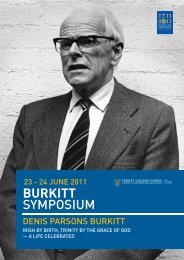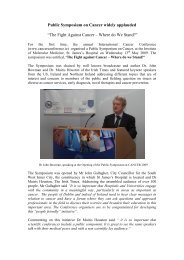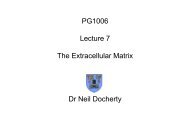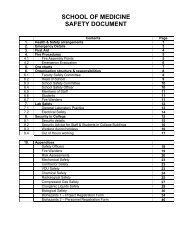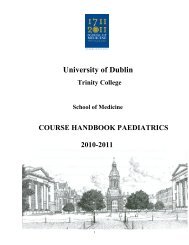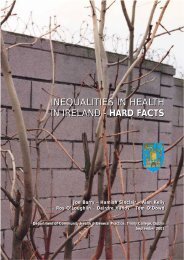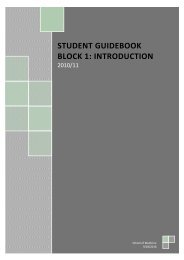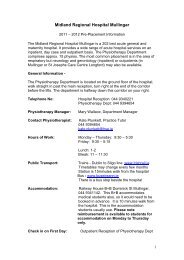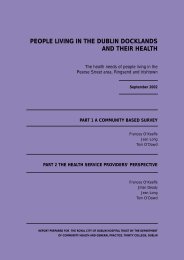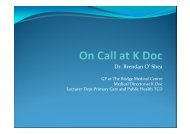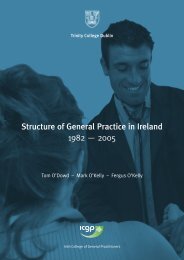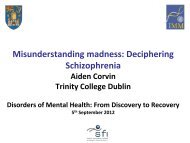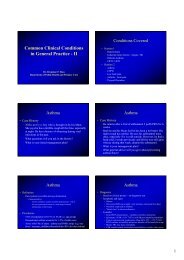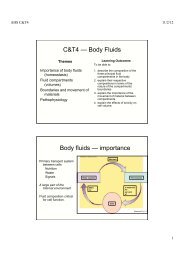Celebrating-30-years.. - School of Medicine - Trinity College Dublin
Celebrating-30-years.. - School of Medicine - Trinity College Dublin
Celebrating-30-years.. - School of Medicine - Trinity College Dublin
- No tags were found...
You also want an ePaper? Increase the reach of your titles
YUMPU automatically turns print PDFs into web optimized ePapers that Google loves.
TCD/HSESpecialist Training Programme in General Practice<strong>Celebrating</strong> our<strong>30</strong>th Anniversary16 September 2005
AcknowledgementsWe are grateful to all who worked so hard to contribute to the success <strong>of</strong> the <strong>30</strong> year celebration,which we are now pleased to mark again with this monograph.Our speakers gave freely and generously <strong>of</strong> their time and managed to entertain and edify.Anne Ó Cuinneagáin, Assistant Director <strong>of</strong> the Training Programme and her assistant Patrice Purcellput in an enormous amount <strong>of</strong> work behind the scenes.ContentsForeword 4<strong>30</strong>th Anniversary Academic Programme 5Biography <strong>of</strong> Dr Martyn Manné Berber 6Introduction 8We are grateful to MERCK Pharmaceuticals and GlaxoSmithKline for their sponsorship, without whichthis event would not have been possible.We would like to dedicate this monograph to the memory <strong>of</strong> Pr<strong>of</strong>essor James Stevenson McCormick,who died in January 2007.In the beginning 10Fit for the purpose 14The changing face <strong>of</strong> General Practice 18Pr<strong>of</strong> Tom O’Dowd, ChairManné Berber Lecture Introductory comment 36Pr<strong>of</strong> Fergus O’Kelly, DirectorManné Berber Lecture 37Department <strong>of</strong> Public Health and Primary Care<strong>Trinity</strong> <strong>College</strong> Centre for Health SciencesAMiNCHTallaght<strong>Dublin</strong> 24September 2007Sub-editing: Deirdre HandyDesign:Janine Handy3
ForewordFrom Manné to Fergus– the journeyThe Eastern Regional General Practice TrainingProgramme was established as the <strong>Dublin</strong> RegionalVocational Training Scheme in 1975 with an intake<strong>of</strong> four trainees. It has grown and developedover the last thirty <strong>years</strong>, into a highly regarded,successful and much sought after TrainingProgramme with an annual intake <strong>of</strong> 12 trainees.This has been greatly assisted by the activesupport <strong>of</strong> the relevant Health Boards and latterlythe Health Service Executive. In recent <strong>years</strong> theassociation with the Department <strong>of</strong> Public Healthand Primary Care at <strong>Trinity</strong> <strong>College</strong> <strong>Dublin</strong> hasdeepened to a point where the Programme is nowan integral part <strong>of</strong> the Department and hencethe name is now the TCD/HSE Specialist TrainingProgramme in General Practice (TCD/HSE Scheme).The associated department in <strong>Trinity</strong> <strong>College</strong> hashad a similar long and tortuous evolution. TheDepartment <strong>of</strong> Public Health & Primary Care, aconstituent discipline <strong>of</strong> the <strong>Trinity</strong> <strong>College</strong> Medical<strong>School</strong>, was established as the Department <strong>of</strong>Social <strong>Medicine</strong> in 1952, in line with developmentsin the United Kingdom and Europe. In the 1970sunder the stewardship <strong>of</strong> James McCormick, itbecame the Department <strong>of</strong> Community Health,which allowed it to take a population view <strong>of</strong>medicine – unusual in Ireland at that time. In the1990s it became the Department <strong>of</strong> CommunityHealth and General Practice with the appointment<strong>of</strong> a Pr<strong>of</strong>essor <strong>of</strong> General Practice in 1993.The Department has since been renamed as theDepartment <strong>of</strong> Public Health and Primary Care, toreflect the nature <strong>of</strong> the work <strong>of</strong> the department,changes in Ireland and in the wider world.Since the 1970s there have been strong linksbetween the Scheme and the department withJames McCormick and Aengus O’Rourke havingfeet in both camps. Indeed this meeting wasthe last one James spoke at and as usual he andeveryone loved it. In 2004 the Department’s closerelationship with the Eastern Regional GeneralPractice Training Programme as it had become,led to the Programme being integrated with theDepartment, within accommodation on the TallaghtHospital campus – just in time for us to participatefully in the celebration <strong>of</strong> <strong>30</strong> <strong>years</strong> <strong>of</strong> generalpractice training, in September 2005.The thirty year celebration marks a sizeablecontribution to general practice and patient carewith over <strong>30</strong>0 fully trained GPs as alumni. MannéBerber who was so <strong>of</strong>ten mentioned on the daycould not have foreseen the success or indeedlongevity <strong>of</strong> the scheme. It is not wise to predictwhat the next thirty <strong>years</strong> will bring but there isa lot to build on and under the current leadership<strong>of</strong> Pr<strong>of</strong>essor Fergus O’Kelly and his team theformation <strong>of</strong> the next generation <strong>of</strong> generalpractitioners is in good hands.Tom O’DowdChair <strong>of</strong> Steering CommitteeEastern RegionalGeneral PracticeTraining Programme<strong>30</strong>th AnniversaryCelebrations16th September 2005Robert Smith Theatre,<strong>Trinity</strong> Centre for Health Sciences,St James’s HospitalAcademic ProgrammeSession 1Thirty <strong>years</strong> a-growing – the past,present and future <strong>of</strong> GP trainingIntroduction – Pr<strong>of</strong> Fergus O’KellyIn the beginning – Pr<strong>of</strong> James McCormickFit for the purpose – Pr<strong>of</strong> Gerard BuryThe changing face <strong>of</strong> General Practice– Dr Brid HollywoodSession 2Annual Manné Berber LectureIntroductory comments – Dr Zita O’ReillyManné Berber Lecture – Dr Muiris Houston5
Dr MartynManné Berber1928 – 1988Dr Manné Berber, born in Glasgow in 1928, waseducated in <strong>Dublin</strong> and graduated from <strong>Trinity</strong><strong>College</strong> <strong>Dublin</strong> in 1952. Following hospital trainingin <strong>Dublin</strong> and Kent, he returned to <strong>Dublin</strong> andjoined Dr John Freedman’s practice in 1954.A year later Manné opened a private practicein Churchtown, where he quickly establishedhimself as an able and caring physician. The poorwere <strong>of</strong>ten treated free <strong>of</strong> charge, and it was notunknown for him to leave a donation when hevisited a home in obvious need. “What’s the goodgiving them antibiotics? They need food!’ he onceexclaimed after leaving 10 shillings with a motherwho could not afford milk for her sick baby.Most Irish doctors <strong>of</strong> the time were members orassociate members <strong>of</strong> the Royal <strong>College</strong> <strong>of</strong> GeneralPractitioners. Manné became a Member in 1964and was elected to Fellowship in 1972. He was atthe forefront in campaigning for an Irish college.Soon after joining the East <strong>of</strong> Ireland Faculty <strong>of</strong> theRCGP in 1965 he was appointed its only tutor. Hisduties took him around the country lecturing to thedifferent faculties, and when the Irish <strong>College</strong> <strong>of</strong>General Practitioners was established in the 1980she became Director <strong>of</strong> Training for its <strong>Dublin</strong> Region.Manné served on numerous committees. His abilityand reputation earned him many honours andhe became Provost <strong>of</strong> the East <strong>of</strong> Ireland Faculty<strong>of</strong> the RCGP, Chairman <strong>of</strong> the Irish Council and aministerial appointee to both the Medical Counciland the Postgraduate Medical and Dental Board.He was a member <strong>of</strong> the Consultative MedicalCouncil on General Medical Practice from 1972 to1973 and a member <strong>of</strong> the Irish Institute <strong>of</strong> GeneralPractice from 1975 to 1984.Dr Manné BerberHis service to the RCGP was regarded as‘incalculable’ and his tireless efforts did much toimprove the image <strong>of</strong> the general practitioner. Atthe age <strong>of</strong> fifty-nine he became the first JewishVice-President-Elect <strong>of</strong> the ICGP, which ensuredautomatic Presidency the following year; twoweeks later death deprived him <strong>of</strong> the honour.As a mark <strong>of</strong> their respect for Manné, the ICGPpresented his widow Marie Berber, with the badgeshe would have received as the President’s wife,had he survived to fill the post.From 1974 he was a Clinical Tutor in the HealthSciences Faculty at <strong>Trinity</strong> <strong>College</strong> and involvedin lecturing to medical students, extendinghis memorable and non-directive style toundergraduate as well as postgraduate medicaleducation. He was a major force in academicgeneral practice in Ireland and pioneeredthe <strong>Dublin</strong> Vocational Training Scheme aswell as taking active part in general practiceresearch on the wider European scene. Hisinterest and ability in teaching was evidencedby the invitation to become a visiting assistantpr<strong>of</strong>essor at the Department <strong>of</strong> Family <strong>Medicine</strong>in the University <strong>of</strong> Western Ontario.With such a busy pr<strong>of</strong>essional life he couldhave been forgiven for avoiding non-medicalcommitments, but such was not the case. Listingjust four <strong>of</strong> his community activities gives anidea <strong>of</strong> the breadth <strong>of</strong> his interests, for as well asserving presidential terms with B’nai Brith and the<strong>Dublin</strong> Jewish students’ union, he was an executivemember <strong>of</strong> the Northern Relief Fund Co-OrdinationCommittee and for three <strong>years</strong> Chairman <strong>of</strong> theChurchtown Community Care Committee.But it is principally because <strong>of</strong> his tireless energyand commitment to the organisation <strong>of</strong> vocationaltraining in the Eastern Health Board region, <strong>of</strong>which he became the first course director in 1975,that we are celebrate him with the annual MannéBerber lecture. His dedication to his task, in spite <strong>of</strong>many difficulties, kept the scheme going, and morethan thirty <strong>years</strong> on, we still marvel at his skill,diplomacy and tenacity.Deirdre HandySources:Ray Rivlin. Shalom Ireland A social history <strong>of</strong> Jews in modern Ireland. <strong>Dublin</strong>. Gill and Macmillan 2003.John Mason. Manné Berber: an obituary. Forum, Journal <strong>of</strong> the Irish <strong>College</strong> <strong>of</strong> General Practitioners, 1988 August.JFF. Martyn Manné Berber: an appreciation. Irish Medical Times, 1988 August.GP’s death a great loss to vocational training [editorial]. Irish Medical Times, 1988 August.7
IntroductionPr<strong>of</strong> Fergus O’Kelly– DirectorGraduates, colleagues and friends, welcome to thiscelebration <strong>of</strong> our <strong>30</strong>th anniversary – thirty <strong>years</strong><strong>of</strong> GP training. We have an interesting series <strong>of</strong>talks for you this afternoon and I will introduce ourfirst speaker soon, but first some opening remarksAt this point I would like to thank our organisingcommittee for their hard work over the last year– I would especially like to thank Patrice Purcell, thescheme secretary for all her hard work delivered ina calm, happy and helpful way; Anne Ó Cuinnegáinfor her close support and keen eye for detail;Deirdre Handy for all her help in innumerableways; Walter Cullen who suggested the format andorganised today’s seminar, and finally Pr<strong>of</strong>essorTom O’Dowd – Chair <strong>of</strong> our Steering Committee – forhis active support and good counsel.Thirty <strong>years</strong> <strong>of</strong> GP training – it is hard to believe!– it went so fast. Michael Flynn has been involvedwith the scheme since its inception and has beeninvaluable to its development. He was initially sentto the scheme as an IMA spy, liked what he sawand stayed! He is now <strong>of</strong> course President <strong>of</strong> theICGP (2005-2006).I was part <strong>of</strong> the first intake <strong>of</strong> trainees onto thescheme and like Michael, haven’t left. I havebeen a trainee, undergraduate tutor, trainer,tutor, Associate Director and, for the last few<strong>years</strong>, Director. We owe much to the visionarieswho organised the scheme in the early days butespecially to Manné Berber our first director and toOwen Clarke our second director.So how did it all start? Well from my perspective itstarted with a handwritten postcard on the noticeboard <strong>of</strong> the Richmond Hospital (now a district court)“Anyone interested in GP training please attendat 2 PM on Wednesday in the Board Room <strong>of</strong> theMater Hospital” I went along and was asked towrite a letter and send a CV. A CV? I wasn’t surewhat it was, so I asked the guys – no help there. SoI asked the girls – even then they knew more thanthe guys!My CV was one side <strong>of</strong> A5 hospital notepaperand half <strong>of</strong> it concerned my prowess on the field<strong>of</strong> sport.The next two <strong>years</strong> comprised <strong>of</strong> fortnightlyevening meetings – you got your own hospitalpost and then out to Greystones for a year as a GPtrainee in Cyril McNulty’s practice. I enjoyed everymoment <strong>of</strong> it.We have come a long way from that time. We haveover 250 graduates <strong>of</strong> the highest calibre – yes,that is you! We have come a long way from theearly days <strong>of</strong> supernumary posts in hospitals,looked upon with suspicion and even derisionby our specialist colleagues. There was fear andloathing by some established GPs who saw noneed for GP training. So what has been the result<strong>of</strong> these <strong>30</strong> <strong>years</strong> <strong>of</strong> GP training? Well, we haveclearly raised the standard <strong>of</strong> clinical practicein general practice. We are now more likely topractice from purpose built or purpose adaptedpremises, have secretarial support, practice nursesand even practice managers. Gone are the days <strong>of</strong>a lock-up surgery over a shop or in the front room<strong>of</strong> your home.We <strong>of</strong>fer a wider range <strong>of</strong> services to our patientsand are more aware and better able to addresstheir needs. We remain highly regarded as apr<strong>of</strong>essional group by the public. We are one part<strong>of</strong> the healthcare service that isn’t broken. Nearly50% <strong>of</strong> all GPs are involved in teaching, takingstudents or supervising GP Registrars in practice.Two <strong>of</strong> the five Pr<strong>of</strong>essors <strong>of</strong> General Practiceare graduates <strong>of</strong> the scheme, as are two <strong>of</strong> theDirectors <strong>of</strong> GP training. Many <strong>of</strong> our graduateshave academic posts either as Lecturers orAssociate Directors.As a scheme we have been dynamic andinnovative. Graduates <strong>of</strong> the scheme were closelyinvolved in setting up the ‘out-<strong>of</strong>-hours’ co-opmovement which has improved services to patientsthroughout the country and transformed the lives<strong>of</strong> GPs and their families, especially in rural areas.The scheme has played a central role in developingthe educational agenda for GP training at local,national and international levels, through ourown fora, through NAPD and through EURACT andWONCA. These developments in GP educationare looked upon in awe and some envy by ourspecialist colleagues. They refer to our system <strong>of</strong>training as the ‘gold standard’.Gone are the days when our trainees weresupernumary in hospital posts. Now our consultantcolleagues are beating a path to our door, <strong>of</strong>feringus many more hospital posts than we need.Such is the reputation and high calibre <strong>of</strong> our GPTrainees. Last year again, this scheme attractedmore applicants than any other training scheme.Yes, we can truly be proud <strong>of</strong> our scheme and itsachievements. However, we will not rest on ourlaurels. This is an energetic and forward-lookingscheme, ably guided by an active, interestedsteering committee.We look forward to further developing the trainingscheme in line with the best <strong>of</strong> internationalpractice. As Buzz Lightyear would say “To infinityand beyond!”9
In the beginningPr<strong>of</strong> James McCormickI was flattered and delighted to make acontribution to the thirty year anniversary andcelebration <strong>of</strong> Manné’s training scheme.I qualified in June 1950 more than fifty five <strong>years</strong>ago, which guarantees that I have well passed my‘sell by’ date.My newly acquired MB entitled me, without anyfurther experience <strong>of</strong> any kind, to embark on acareer in general practice. The pre-registrationyear had not yet been invented.In 1950, by comparison with today, therapeuticimpotence was the norm. We had sulphanomidesand penicillin and soon streptomycin but notetracyclines or other antibiotics. No tranquillisers;amylobarbitone. No antidepressants. No NSAIDs,no steroids. No cimetidine, the treatment <strong>of</strong> pepticulcer was partial gastrectomy and subsequentlyadded vagotomy. No proton pump inhibitors.Perhaps most important – no ‘pill’.Acute rheumatism was still common and manypeople were crippled by the resultant cardiacdamage. The first mitral valvotomy was in thefuture, as were joint replacements and goodcataract surgery.We did silly things, but no more than today. As ahouse physician I carried out autohaemotherapyas a remedy for psoriasis. This involved taking10ccs, as they were then, <strong>of</strong> blood from theantecubital fossa and injecting it into thebuttock <strong>of</strong> the unfortunate. This I am suredid as much good as homeopathy and wasthought to stimulate the phagocytes.I was not a skillful house surgeon but therewas one operation which was delegated tome and which I carried out with skill andone hundred per cent success. This was torelieve the pain <strong>of</strong> intermittent claudicationby cutting the Achilles tendon, which gotrid <strong>of</strong> the pain, but at what a price!Pr<strong>of</strong> James McCormickIn 1950 there was no nonsense about risk markersfor coronary heart disease. We immunised againstdiphtheria and tetanus and later on polio, but nomeasles and no pertussis.In 1950 we did not know aboutcigarettes and lung cancer.In 1953 I was working in wards at St. Mary’s whichwere attached to Alexander Fleming’s laboratories.While there I began for the first time, to curetuberculous meningitis by the intrathecal injection<strong>of</strong> streptomycin. Biddy was the charge nurse andwe have been together ever since!In the late forties and early fifties there werethe first stirrings towards a college for generalpractice. Interestingly two <strong>of</strong> the leaders, JohnHunt and John Fry were both ‘failed specialists’.John Hunt was a Member <strong>of</strong> the <strong>College</strong> <strong>of</strong>Physicians and John Fry a Fellow <strong>of</strong> the <strong>College</strong><strong>of</strong> Surgeons, but consultant posts in the newNHS were in short supply. John Hunt, later LordHunt, had a fashionable west end private practiceadjacent to the embryo college <strong>of</strong> which he was thehonorary secretary for many <strong>years</strong>.The college was founded in 1952. It was, and stillis, structured around regional faculties and therewere four in Ireland, one for each province.Membership <strong>of</strong> the college was achieved bycompleting an application form and the payment<strong>of</strong> a subscription, – no examination. There washowever, a ludicrous Board <strong>of</strong> Censors on which Isubsequently served, which scrutinised applicationforms to no useful purpose.In the early sixties I became the East <strong>of</strong>Ireland Faculty representative on <strong>College</strong>Council. After five <strong>years</strong> I was elected fromthe body <strong>of</strong> the college and continuedon Council until the seventies.While Donald Irvine, subsequently Sir Donaldand President <strong>of</strong> the General Medical Council,was chairman <strong>of</strong> council he began to explorepostgraduate training for general practice.While the President is the titular head <strong>of</strong> thecollege the Chairman <strong>of</strong> Council is the effectivehead. He immediately ran into a problem – noone would accept general practice as a specialty,something that has dogged us for <strong>years</strong>, and a newterm was coined – vocational training.This new vocational training was at that timestandardised as two <strong>years</strong> <strong>of</strong> further, allegedlyrelevant, hospital experience after the intern year,followed by a year in general practice.This grossly unsatisfactory pattern became set intablets <strong>of</strong> stone and persisted for far longer thanit should have done. It is only now that we arebeginning to experiment with four year trainingincluding two <strong>years</strong> in general practice.In time we in Ireland recognised the need forfurther specific training and in the Republic themain movers were Manné Berber in <strong>Dublin</strong> and BillShannon in Cork.Manné was an orthodox Jew. The contribution <strong>of</strong>jewry to our discipline can hardly be overstated.It includes John Fry, Paul Freeling, Stuart Carne,Clifford Kay and Marshall Marinker. One’s firstimpression <strong>of</strong> Manné was <strong>of</strong> a gentle man with adelightful smile. There was nothing bombastic oraggressive in his manner, yet underneath was asteely resolve which he needed in order to achievehis objective.Contd.11
Manné had the problem <strong>of</strong> establishing trainingin a city which had three medical schools andno undergraduate departments. Althougha <strong>Trinity</strong> graduate he wisely and cleverlyavoided his scheme being identified with anyone school. This was no mean achievement.Those who have been taught by Manné stillspeak with reverence about his contributionto their learning. Sadly he died suddenly whilestill far too young. We are his inheritors.The next major development was Michael Boland’sIrish <strong>College</strong>. I have said Michael Boland’s collegebecause it was his faith, enthusiasm and drivewhich brought the college into existence. Hischild had such godparents as Cormac Macnamaraand John Mason, who as presidents <strong>of</strong> the infantcollege played a major part. They are both muchmissed. The <strong>College</strong> has gone from strength tostrength and success in its examination nowentitles the candidate to specialist recognition.McCormick report foresaw a replacement need <strong>of</strong>60-70 a year. This in the interim was never met andtogether with the feminisation <strong>of</strong> the disciplinemeans that there is a huge and growing unmetneed and no prospect <strong>of</strong> a quick fix. Our President,Michael Flynn had some wise words on this subjectin a recent Forum 1 .Hospital medicine is disease medicine.General practice is people medicine.The rewards <strong>of</strong> general practice are not usuallydiagnostic nor therapeutic wizardry. The rewards<strong>of</strong> general practice derive from our relationshipwith those people who are our patients. Beinga personal doctor is something which generalpractice uniquely <strong>of</strong>fers. It is also something <strong>of</strong>value to both physician and patient. If it disappearsthe main raison d’être for general practice dieswith it.Bertolt Brecht’s Galileo said “The chief cause <strong>of</strong>poverty in science is imaginary wealth. The chiefaim <strong>of</strong> science is not to open a door to infinitewisdom but to set a limit to infinite error.”The chief cause <strong>of</strong> poverty in medicine is alsoimaginary wealth. Scepticism is a tool inits identification.Epidemiology is responsible for much imaginarywealth. For example – there is no good evidencethat what we eat determines whether ornot we die <strong>of</strong> coronary heart disease. Thereare no good randomised controlled trials <strong>of</strong>dietary manipulation (not an easy thing to do).Nevertheless the role <strong>of</strong> diet in coronary heartdisease is an example <strong>of</strong> wishful thinking, notsomething supported by evidence. Butter andcream are good for you and taste nice as well.Statins don’t work by lowering cholesterol, highercholesterols are good for older people and so onand so on.I have been lucky to have practised medicinewhen it was relatively easy and am glad not tobe now beginning my career. General practice isnot easy, it was not easy when I was practising,and it has become more difficult. More difficultbecause <strong>of</strong> the change in patients’ expectations,the possibility <strong>of</strong> litigation and the complexity <strong>of</strong>advancing knowledge.Nevertheless general practice is a marvellous job.Go well! And enjoy it!We also have undergraduate departments inall our medical schools. I take sly pleasurefrom the fact that the heads <strong>of</strong> departments<strong>of</strong> general practice in our National University,Gerry Bury, Colin Bradley and AndrewMurphy, are all my ex-students.Having idiosyncratically galloped through the past,what <strong>of</strong> the future?It seems certain that for the next decade or so, fouryear training will become the norm but it would besad if that was seen as an adequate response toneed. We should cultivate postgraduate electivesto polish special interests including research,which for most people is a futile shibboleth.The full effects <strong>of</strong> the manpower crisis are notfar distant. In 1972 what became known as thePractising hospital medicine in the community is byand large an unsatisfactory activity, whereas beinga personal doctor brings great rewards.Those <strong>of</strong> you embarking on your chosen careerface difficulties in creating the opportunity forcontinuity <strong>of</strong> care which is a prerequisite forpersonal care. Continuity does not mean beingavailable for 24 hours a day, 365 days a year, but itdoes mean an attempt to be reasonably accessibleto those who seek your help.There is one quality you will need in order t<strong>of</strong>ulfil your potential to help people. Scepticism.Scepticism is not a synonym for cynicism, but it isthe “scalpel which frees accessible truth fromthe dead tissue <strong>of</strong> unfounded belief andwishful thinking”.Only scepticism provides a degree <strong>of</strong> protectionagainst the fashionable which is doubtful andorthodoxy which perpetuates error.1Flynn M. Growing complexity <strong>of</strong> GP training [Editorial]. Forum September 2005; 22(9):5.13
Fit forthe purposePr<strong>of</strong> Gerard BuryPr<strong>of</strong>essionalism– a suitable case for training?‘Becoming a general practitioner needs someonenot only to fill the knowledge pot through trainingbut to light the fire under it through education’ 1IntroductionRobin HullAs a graduate <strong>of</strong> the programme, the opportunityto acknowledge its <strong>30</strong> year contribution to Irishgeneral practice is a welcome one. I had theprivilege <strong>of</strong> being a trainee in the then <strong>Dublin</strong>Regional VTS between 1982 and 1985 andbenefited greatly from that opportunity. Theleadership <strong>of</strong> Dr Manné Berber in establishing theprogramme and setting the educational themeswas particularly important and set the standardsfor the future development <strong>of</strong> the scheme.One <strong>of</strong> Manné’s key contributions was toencourage learning by reflection. He demonstratedthe importance <strong>of</strong> that reflection not only as ateacher but also as a researcher. In one <strong>of</strong> hispublications on the morbidity pr<strong>of</strong>ile <strong>of</strong> Irishgeneral practice, he emphasised key points aboutthe nature <strong>of</strong> practice:‘These tables are important in that they showthe difference between the range <strong>of</strong> illness in thehospital compared with that in general practice.It is against these different backgrounds that theprobability <strong>of</strong> diagnosis must be made.This is one <strong>of</strong> the most important adjustments <strong>of</strong>attitudes that entrants to general practice mustmake if they are to succeed.’ 2He concluded:‘I would recommend similar exercises to mycolleagues. The information gathered froma number <strong>of</strong> varied and scattered practicesthroughout Ireland could allow us to assess ourpresent state and our future needs’The future needs <strong>of</strong> general practice – Manné, asever, pointed us in 1974 to reflect on our roles asgeneral practitioners and to consider how thoseroles would evolve. Pr<strong>of</strong>essionalism in medicineis one such role and its importance in the generalpractice <strong>of</strong> the 21st century is an issue which Ibelieve Manné would commend to us.How does pr<strong>of</strong>essionalism impact on training forgeneral practice in the 21st century?A new healthcare pr<strong>of</strong>essionIn the last year I have had the privilege <strong>of</strong> workingwith Ireland’s newest healthcare pr<strong>of</strong>ession– Advanced Paramedics in the ambulance services.The opportunity has given me much to considerabout what pr<strong>of</strong>essionalism means in medicine.In 1993, a Department <strong>of</strong> Health Report on theAmbulance Services recommended that Irelandshould have paramedics trained to administerdrugs and carry out key interventions for patientswho are seriously ill or injured. Ireland’s healthservice has taken the 12 <strong>years</strong> since then to fulfilthis recommendation but in 2005 the first cohorts<strong>of</strong> Advanced Paramedics completed theirtraining and entered the newly establishedpr<strong>of</strong>essional register.Emergency Medical Technicians and paramedicsshare many characteristics with GPs in Ireland– they number around 2,000 practitioners,<strong>of</strong>ten work in ones or twos and have a workloadcharacteristic <strong>of</strong> primary care – patients definewhen they call for help and for which problems.They have also a limited evidence and researchbase for their roles but a significant potential todevelop such information.I have been strongly reminded:• <strong>of</strong> the value <strong>of</strong> continuity in general practice –single stressful episodes <strong>of</strong> care lasting minuteshave extreme limitations• that consultations take many forms• that clinical competencies are transferablewithin healthcare pr<strong>of</strong>essionsWhat lessons can welearn from this emergingpr<strong>of</strong>ession?First, about absolute determination to achieve atask. To establish a fledgling pr<strong>of</strong>ession, legislationwas needed for a statutory body to be its regulator– the Pre-Hospital Emergency Care Council. 3The PHECC is responsible for the education andregistration <strong>of</strong> Advanced Paramedics, sets theirCode <strong>of</strong> Conduct, provides a disciplinary processaccessible to the public and develops evidencebased Clinical Practice Guidelines. It has takenmuch patience and considerable skill to establishthe supervisory structures associated with whatis only the sixth healthcare pr<strong>of</strong>essional grouping(after doctors, nurses, dentists, pharmacists andopticians). Politicians, civil servants, doctors andmembers <strong>of</strong> the pr<strong>of</strong>ession itself have all had tobe convinced that a benefit to the public wouldresult. The sense <strong>of</strong> purpose required hasbeen considerable.Next, about dedication to clinical purpose. Thefirst cohorts <strong>of</strong> Advanced Paramedics have hadto explore their role ‘on the ho<strong>of</strong>’ and that role isa most demanding one. APs deal with people attheir most vulnerable – 5% to 10% <strong>of</strong> all contactsare with patients who are dead or dying andmost others involve acute cardiac emergencies,hypoglycemia, seizures or serious injuries.Thirdly, about reflective learning. Members <strong>of</strong> thisdeveloping pr<strong>of</strong>ession have been rigorous – andsometimes ruthless – in identifying the road mapfor their framework <strong>of</strong> development and for thecharacteristics they want to be identified with theirwork. High quality work, accountability, CPD andcontributions from other pr<strong>of</strong>essions are amongthe issues they have identified and incorporated.How are these themes reflected in medicinein Ireland?Contd.15
Pr<strong>of</strong>essionalism in medicineIn 2002, the Lancet and Annals <strong>of</strong> Internal <strong>Medicine</strong>took the unusual step <strong>of</strong> jointly publishing‘Medical Pr<strong>of</strong>essionalism in the New Millennium:A Physician Charter’. 4 The charter is founded onthree core principles. The first is the primacy <strong>of</strong>a patient’s welfare, the second the autonomy <strong>of</strong>individual patients and the third, social justice,calls on doctors to work actively for the equitabledistribution <strong>of</strong> health-care resources. Commitmentto the well-being <strong>of</strong> patients, empowering informedtreatment decisions, eliminating discrimination inhealthcare – are these the fundamentals on whichwe plan and run our practices?The responsibilities which flow from theseprinciples include commitments to:• pr<strong>of</strong>essional competence• patients’ confidentiality• maintaining appropriate relationships withpatients• improving quality <strong>of</strong> care• improving access to care• a just distribution <strong>of</strong> finite resources• scientific knowledge• maintaining trust by managing conflicts <strong>of</strong>interest• pr<strong>of</strong>essional responsibilitiesIf these principles and the associatedresponsibilities are to be accepted in Irishmedicine, they must be examined andimplemented. If they are to be the fundamentals <strong>of</strong>practice, they must also become the fundamentals<strong>of</strong> training in medicine.The Royal <strong>College</strong> <strong>of</strong> Physicians and Surgeons <strong>of</strong>Canada has actively worked towards transformingthese principles into working themes, both fortraining and practice. The CanMEDS Projecthas evolved since 1996 as a ‘Canadian MedicalEducation Directives for Specialists’ framework <strong>of</strong>core competencies for all doctors. 5 The frameworkplaces ‘medical expertise’ at the centre <strong>of</strong> theframework but surrounds it with themes such ascollaborator, communicator, scholar, pr<strong>of</strong>essional,health advocate and manager (Figure 1).An Irish general practiceframework?The much criticised Primary Care Strategysuffers from problems with implementationbut contains a wealth <strong>of</strong> challenges withrelevance to our roles as medical pr<strong>of</strong>essionals. 6It outlines what might be seen as a jobdescription for the general practitioner <strong>of</strong>the next decade with roles including:• Clinical expert• Community health action• Shifted specialist care• Disability rehabilitation• Team leader/team member• Population prevention• Information management• Audit/monitoring/QA• Resources managerI would argue that the themes outlined in thePhysician Charter on Pr<strong>of</strong>essionalism are theframework within which these and other rolesin general practice will succeed. Without such aframework, these tasks represent increasinglydiverse technical challenges which we may becomevery pr<strong>of</strong>icient at, but whose purpose may be lost.The purposes <strong>of</strong> medicine include the very issueshighlighted by the Charter – the primacy <strong>of</strong> ourpatients’ welfare, the autonomy <strong>of</strong> individuals anda socially just setting in which those with mostneed receive most care.These themes underpin the goals set outby Manné Berber and his colleagues whenthey established vocational training forIrish general practice in the 1970s.Do these goals remain at the forefront <strong>of</strong>postgraduate training for general practice in theIreland <strong>of</strong> the early 21st century? I believe they dobut that their urgency and importance may havetaken a back seat, perhaps beset by the pressures<strong>of</strong> educational theory, economics, accreditation,accountability and accountancy and multipledemands on trainers and doctors in training.The <strong>Dublin</strong> VTS <strong>of</strong> the 1970s and now the ERGPTP Figure 1: The CanMeds roles framework<strong>of</strong> the 21st century has contributed much to Irishgeneral practice. I believe it has the capacityand willingness to put these themes back intothe forefront <strong>of</strong> postgraduate training in generalpractice and thereby to reinforce the importance <strong>of</strong>these goals for medicine in Ireland. The leadershipand pr<strong>of</strong>essionalism <strong>of</strong> the ERGPTP has faced manychallenges in the past and succeeded with each– here perhaps is a more serious challenge thanmany we have faced before and one I am confidentwill be addressed by the ERGPTP <strong>of</strong> the future.1 Berber M. Irish general practice. JIMA 1974;67:169-172.2 Hull R. Education for general practice. BMJ 1989;299:9963 Statutory Instrument 21/2000. Establishment <strong>of</strong> the Pre-Hospital Emergency Care Council.4 Medical Pr<strong>of</strong>essionalism in the New Millennium: A Physician Charter. Lancet 2002;136:244-246.5 CanMEDS. RCPSC, 2005.6 Primary Care Strategy. Department <strong>of</strong> Health & Children, 1999.17
The changing face<strong>of</strong> General PracticeDr Brid HollywoodI was honoured at being asked to speak at thismeeting and also feel very privileged to be part <strong>of</strong>this scheme. I was what was then called a ‘trainee’twenty <strong>years</strong> ago. I would like to introduce you tomy registrar from the scheme who is sitting in theaudience training, Dr Seoighe Ni Rua.Before I start I would like to introduce FionaBradley to anyone <strong>of</strong> you who do not know her.Fiona was a graduate <strong>of</strong> this scheme and weworked very closely together for 7 <strong>years</strong>. She diedthree <strong>years</strong> ago. She contributed enormously togeneral practice and also to my life. I would like todedicate this talk to her.This talk is in no way intended to beautobiographical, but a little aboutmyself is not a bad introduction to thechanging face <strong>of</strong> general practice.I started my life in this house – I don’t rememberit – it was the house <strong>of</strong> a DMO, a district medical<strong>of</strong>ficer as GPs were then called. It was ownedat that stage by the corporation and given at aminimum rent to the GP. It was built on the edge <strong>of</strong>bog on the street <strong>of</strong> Carna, in Connemara.My parents moved to Athenry <strong>of</strong> the Fields <strong>of</strong>Athenry fame. We lived in this house, again ownedby the corporation.Living in ‘the fields <strong>of</strong> Athenry’Dr Seoighe Ni Rua Dr Fiona Bradley 28/9/1961 – 25/11/2002Brid Hollywood’s childhood home in ConnemaraYou can see how over 46 <strong>years</strong> later it haschanged. Dr Casey runs a great show from hereand he was responsible for building this purposebuilt health centre.Dr Casey’s home and purpose built health centreThe patients were seen in the house in the frontroom on the left and they waited in the hall. Thefamily was involved in 24-hour care, answeringdoors and phones. The phone number was Athenry34. At least in the beginning, the phone was aparty line – this meant that the five owners <strong>of</strong>phones in the town were contacted by one ringfor one, two for another etc. Each could listen inon the other. At least the current discussions onconfidentiality and general practice do not facethis problem!The GP was a presence in the house and we got toknow our father very well. He took the current preschoolchild on all house calls giving my mothersome rest until we went to school. The brother <strong>of</strong> aclassmate died in this front room from croup. In myclass were twins, one <strong>of</strong> whom was less intelligentthan the other. I knew why but never told. Themother had been in obstructed labour and themidwife called my father. The first child wasdelivered and he was about to do a decapitation <strong>of</strong>the second child to deliver her, rather than lose theContd.19
mother’s life, when the midwife heard a heartbeat.They took down the door <strong>of</strong> the woman’s bedroomand carried her to the car. My father drove her toGalway where my friend was delivered by section.Confidentiality was inbred in us and if we slippedup, it was beaten into us.The public patients were seen across the road inwhat was called the dispensary. Another name forthe GP was the dispensary doctor. In 1972, thatchanged when the first GMS contract was signed.After that, private and public patients had to betreated the same.I graduated from this scheme when Manné Berberwas still the Course Director. I started my GP life inWicklow with Neil Golden as a trainer.Drs. Fergus O’Kelly, Neil Golden, Fiona Bradleyand Michael FlynnNext Friday they join Carlow Doc, the nearest co-opand Dr Nick Byrne tells me he cannot wait. His lifewill entirely change.The changing out-<strong>of</strong>-hours cover which is nowin place in many places in Ireland, in addition to<strong>of</strong>fering GPs a hugely better life, will continue tohave wide reaching effects on retention <strong>of</strong> generalpractitioners, particularly in rural areas.I spent one year working in James’s Street in<strong>Dublin</strong> and a number <strong>of</strong> <strong>years</strong> abroad. In the80s while we were away, many <strong>of</strong> you willremember there was a moratorium on GMSposts and none were being advertised.Left to right: Aoife, Patrick and Niamh HollywoodWith Fiona Bradley’s encouragement, I bit thebullet and interviewed for a GMS list in Ballymun.Neil is second on the left – it was a fantasticpractice and very advanced for its day. I lovedevery daylight moment <strong>of</strong> it, loved the driving, thecountryside and the house calls, but found the out<strong>of</strong>-hourscalls very hard.I was lucky enough to return to a part-time fiveyear lecturing job in <strong>Trinity</strong> with Pr<strong>of</strong> Tom O’Dowdand worked as an assistant with Patrick McGrathwho is on this training scheme and then DeenaRamiah in Clondalkin in this surgery.The doctor’s daughterThe surgery in BallymunWhile it was a very happy, and by local standards aprivileged childhood, being the doctor’s daughterwas very claustrophobic. For example I was goaliein our local school camogie team and overheardFr O Grady, the vice principal say, ‘’Jaysus thedoctor’s daughter has a great puc! ‘’I felt a great sadness when we left Athenryat the age <strong>of</strong> 14. However, I embraced thefeeling <strong>of</strong> anonymity which <strong>Dublin</strong> <strong>of</strong>feredand felt hugely liberated. I would neveragain be ‘the doctor’s daughter’.Top left to right: Training in Neil Golden’s practiceand driving to house callsBottom left to right: Making a house call and thenew premisesThe doctors in this practice who have now movedinto this new premises have done 24 hour on callever since. They do not know what it is to getseven nights in a row sleep. This has made gettingpartners, women doctors or locums difficult.Left: Pr<strong>of</strong> Tom O’DowdRight: Deena’s old surgeryI loved teaching and even liked creating a researchquestion and gathering data. Writing a paperhowever, filled me with a boredom I could taste.I had to face it – the P values I had been mostinterested in until then were getting these threeout <strong>of</strong> nappies and to school age.No one else applied for the position!I came first in the interview because no oneelse applied for that particular position. I gota list <strong>of</strong> 600 GMS patients who had been verywell looked after by my predecessor Dr MuirisHouson. There was literally no room for me inthe building. I put my eye on the men’s toilet– the greatest bit <strong>of</strong> persuasion I have everdone in my life, and I would not mind it on myepitaph, was to persuade the health board toallow me convert the toilet into a surgery.Contd.21
Left to right: The men’s toilet door, the men’s toilet,from toilet to surgery!the story <strong>of</strong> my life so it is nothing new for me.However, in advance, I may need to apologise to afew people for what I am about to say and show!Please forgive me.Feminisation <strong>of</strong>General Practice1985, a watershed year!to persuade us that he possessed these attributes.While at interview the girls were all genuine stars.We may have to change the criteria at the interviewprocess. This is not the same as being biased infavour <strong>of</strong> men; it would merely be recognitionthat current interview processes may be biased infavour <strong>of</strong> women.What are the implications <strong>of</strong> the feminisation thatis taking place?Some <strong>of</strong> my male colleagues were not impressedas they now had to share the ladies’ toilet, but theyrecovered. Ballymun had to be a place <strong>of</strong> equalopportunities I felt.At that time, I met Dr Pippet who had been thesenior partner in my training practice. We wereat some social ‘do’, both well dressed. He askedme where I worked. I told him ‘’Ballymun HealthCentre’’. There was a pause and then he said ‘’OhBrid and I thought you had such great potential’’!A window with potential in the Ballymun surgery!There have been huge changes in general practiceand huge changes in society over the last <strong>30</strong> <strong>years</strong>.The time will allow me to visit only some. Also thistalk took on a life <strong>of</strong> its own. With the help <strong>of</strong> awonderful medical student, Clare, I gathered allthe information I needed for a very erudite andacademic talk. Then I rang a few GPs and familymembers for photos – as they arrived, I kept rewritingthe script to suit the photos – that is alsoA GP in the 80s……and now …Arthur Courtney and colleaguesI know that it is expected <strong>of</strong> me to speak on thistopic and indeed it one <strong>of</strong> many sociological shiftsthat have taken place in general practice. Walkinto any GP’s surgery in Ireland, and there’s a goodchance that you’ll be seeing a female doctor. Thirty<strong>years</strong> ago, the graduation classes would have been70% men.1985 was a watershed year, not just becauseFergus Mason is sitting in the top row 2nd fromthe right hand side, Arthur Courtney is top row, 5thfrom right, Muiris Houston, third row, 10th fromright and Marie Scully, as one would expect, sittingin the first row, 1st person – but in this year therewere 50: 50 men and women qualifying.Apparently there were only two men in a recentmedical year in Galway – could this be true?More women doctors are choosing GP as a careerthan men. Why? – well the obvious reason – it isa more flexible pr<strong>of</strong>ession and there is not thesame need to go abroad. Secondly when they doapply for GP training schemes, they seem to dobetter in the application process – why? Goodcommunication skills, skills <strong>of</strong> listening, empathyand a high degree <strong>of</strong> emotional intelligence areattributes that we tend to look for in a GP. They areattributes which are most <strong>of</strong>ten associated, andI think wrongly, with being female. This may befrightening men from considering general practiceas a career.Certainly they are attributes, which at interviewwe look for when taking people on to the trainingschemes. I interviewed two <strong>years</strong> ago with theUCD training scheme. A male GP who had spentthree weeks with us and whom I know to befantastic with patients, was not able at interviewThe first and obvious one is the need to retainwomen in practice or otherwise the manpowercrisis will get worse. The solution to that is tosupport women a little during the few <strong>years</strong>when they need flexibility – by having part-timepartnerships, part-time GMS contracts and goodout-<strong>of</strong>-hours work arrangements. The broaderimplications for the future <strong>of</strong> general practiceare less easy to predict. Pr<strong>of</strong>essor Carol Black,President <strong>of</strong> the Royal <strong>College</strong> <strong>of</strong> Physiciansin the UK makes the controversial argumentthat medicine as a whole may lose status, maydepr<strong>of</strong>essionalise if it comes to be seen by thepublic as a pr<strong>of</strong>ession dominated by women.I agree that there may be a ‘man’ power crisisand I suppose the challenge is to find more men!However, I would certainly like to disagree with thesuggestion that a predominantly female pr<strong>of</strong>essionwill cause a depr<strong>of</strong>essionalisation <strong>of</strong> the wholepr<strong>of</strong>ession. Not when Doctors Maria Wilson,Zita O’Reilly, Seoighe Ni Rua and all the otherwonderful women GPs sitting in this room heretoday are around.What is the impact on the patients?Well that is an interesting one. A sort <strong>of</strong> apartheidhas developed in general practice – we feel thatwomen should look after women and men aftermen. What a nonsense and a dangerous one asit leads to de-skilling. There has been a hugeContd.23
pendulum swing that even the men have boughtinto. This change <strong>of</strong> perception is a challengefor training and the training schemes. This is asociological shift, a pendulum swing but will thependulum swing back?And in case any one <strong>of</strong> you very young registrarslistening to this talk think that you have amonopoly on fun and that it does not get better, Iwould like to let you know that if you love fun as achild, you will love it as an adult.I think that whatever one’s sexual orientation,heterosexual, homosexual or lesbian, that wecan intellectualise it any way we want, if generalpractice becomes a totally female pr<strong>of</strong>ession, it willbe a pity and we will miss the old men.PremisesMany people were very helpful to me and sent mewonderful slides. Dr Maria Scully has a practicemanager and he was wonderful altogether. He wasso good that I asked him to send me his picture.Abbey Medical Centre pre-1991The manner in which the bricks and mortar <strong>of</strong>A patientShould general practice become a mainly femalepr<strong>of</strong>ession, some <strong>of</strong> the fun would be lost.A young Dr Zita…Dr Scully’s very helpful practice managergeneral practice are funded is under much debate.For planning permission reasons and generallyfor the sanity <strong>of</strong> a family, GPs tend not to set up intheir own houses any more. This is the story <strong>of</strong> DrMarie Scully’s changing practice and is the patternfor many practices. This is enviable, somethingthat has taken <strong>years</strong> <strong>of</strong> sweat and team building.But how do you fund it?When it arrived my daughter said to me – eyeslighting up – “What are you doing with thatpicture?” I said “It is a picture <strong>of</strong> Maria Scully’sreceptionist”. “That’s Brad Pitt’’ She said. “It’s not’’At college…And still fun loving!I told her – “that is Maria Scully’s receptionist” andI still think it is Maria Scully’s receptionist!And afterwards...When I was in St. Louis <strong>School</strong> in Rathmines, itwas not unusual for girls to consider entering theconvent. A friend <strong>of</strong> mine, just in case God wascalling her, went to see the Medical Missionaries<strong>of</strong> Ireland. She interviewed them and they her. Shewas a bit <strong>of</strong> a character and after spending sometime talking to them, she said. ‘’I don’t thinks it isfor me sister, I would miss the old sex!’’As you all know, in the audience at the moment isMuiris Houston and I have a very good Idea – ZitaDillon and I might ask Muiris if we can write nextSaturday’s column on what’s hot and what’s coldin the Irish Times – he might have a bit <strong>of</strong> pull.What’s Hot? – having a male practice receptionistwho looks like Brad Pitt. What’s Cold? – thefeminisation <strong>of</strong> general practice.Dr Marie Scully: A doctor in waiting; after <strong>years</strong> <strong>of</strong>blood, sweat and tears qualified at lastContd.25
Not forgetting to have a drink along the way!Expansion continues – the search for new premises…when that’s all done, it’s back to the hard work!The new Ballymun Health CentreAt the winter meeting <strong>of</strong> the ICGP, future models<strong>of</strong> funding for general practice were debated. DrGarret Igoe opened with a marvellous presentation<strong>of</strong> the Virginia Primary Care Strategy and certainlyit was the envy <strong>of</strong> all who attended the meeting.In this case the state funded the building, whichhouses the primary care strategy group.The state has not given an undertaking to buildvery many further premises for general practice.Dr Ronan Boland presented the model favouredby the IMO. The overriding message here is “Makesure you own your own business” – he advocatedthe development <strong>of</strong> primary care centresthroughout the country owned and managed bythe GP. Dr Marie Scully’s is an excellent example<strong>of</strong> this.You expand: Abbey House Medical Centre 1991-2005Abbey House moves again in 2005Virginia Primary Care Strategy GroupWe in Ballymun like the Virginia practice hopeto move into this building, which is totallyState owned.Kilcock Health CentreThen you expand the partnershipSing and dance and build team morale and…Contd.27
The message was that we best understand our ownbusiness so why not run it? This can be fundedfrom the bank or perhaps by rent from others, suchas dentist or pharmacy.The third presentation was by Fergus Hoban. Heaims to build 60 large centres around the countryeach housing six GPs. He will take all the risk, doall the work, and leave the GPs autonomous.They will own their own surgeries and pay lessthan the market value to do this. He has spent alot <strong>of</strong> time on designing a model, which keeps anethical distance from the pharmacy.What is certain now is that a GP with a list <strong>of</strong>Nobber Health Centre then……and nowDentist600 GMS and 600 private patients cannot affordto open in many parts <strong>of</strong> the country withoutlooking at some type <strong>of</strong> economic model. Whatwe are seeing is General Practice changing from acottage industry run in our own houses by singlehanded GPs to group practices run either in stateowned premises or as part <strong>of</strong> a business model.Not everyone is happy with this. One institutionin general practice called Dr Cyril Daly, who hasnot and never will change, feels that there is anew stratum <strong>of</strong> medical care being introduced– an organic growth he calls it, and he is not surethat it is desirable. He suggests that the shapeand size and quality <strong>of</strong> general practice are nowbeing determined not by patient needs, not bythe wish <strong>of</strong> many doctors, but by a vigorousentrepreneurialism. However as much as one maylaugh at what he writes, there is a point that canbe made. We are building lovely big buildings – andwe think/hope that they will provide better care.However Dr Marie Wilson has chosen to stay inthis premises – and is very proud <strong>of</strong> the care that isprovided from this house.Dr Marie WilsonDr Marie Wilson’s surgeryThe quality <strong>of</strong> general practice is probablynot determined by the building only, althoughit must be a big factor but is determinedby the people and the services theyfacilitate. However, it is fantastic to see theinfrastructure <strong>of</strong> general practice improve.Dr Deena Ramiah’s new premisesPharmacyContd.29
Primary Care StrategyChronic IllnessDr Garrett IgoeIn the September issue <strong>of</strong> Forum, Dr Igoe <strong>of</strong>Virginia Primary Care Strategy said that he feltthat too much time has been spent discussingthe infrastructure and not enough on how teamswork together in general practice. The idea <strong>of</strong> thePrimary Care Strategy was that a team <strong>of</strong> peoplewould work together on complex problems. Anymember could refer to any other and clients couldself refer. There are only 10 pilot teams around thecountry. And we are privileged in Ballymun to beone <strong>of</strong> them.What we are able to <strong>of</strong>fer our patients as a result<strong>of</strong> working in a true team is huge. Twenty <strong>years</strong> agowhen doing the GP Membership, all right answersto patient care seemed to involve a team. Despiteworking in many areas since and being on goodterms with local public health nurses, social workersand other health providers, the only team timeswere conferences held about problem families.These as we all know usually occur in the middle<strong>of</strong> the day and seem to be attended by very goodpeople who have much more time than ourselvesto solve problems. The primary care strategy wasthe first real effort to create a team and creating ateam is not easy.Barriers to team work include the different culturesthat exist between the health board and us as GPs.We are used to taking decisions quickly and actingon them – no minutes – done and dusted. Thereis another culture with time for meetings, c<strong>of</strong>fee,and review <strong>of</strong> minutes, which belongs to a differentworld. A huge barrier is the fact that public healthnurses remain geographically based rather thanbased around a practice or a group <strong>of</strong> practices. DrGarrett Igoe suggests, and I would agree with him,that all patients should register with a team, whichis not geographical but serves a number <strong>of</strong> GPpopulations. It is very hard in one practice to havepatients excluded because <strong>of</strong> geography.While it looks as though there is not funding toroll out the primary care strategy in the way it hadbeen planned – huge lessons can be learnt fromworking as a real team and I believe that there arehuge potential benefits for patients. Because theprimary care strategy is expensive and progress isslow – it may not change the face <strong>of</strong> Irish GeneralPractice, however many <strong>of</strong> us privileged enoughto work as part <strong>of</strong> a primary care team would likemore thought given to this area as we believe thatour patients greatly benefit.A patient in the surgeryGeneral practitioners always looked after chronicillness. However there are more treatmentsavailable now and more people developing illnesssuch as diabetes. The known prevalence <strong>of</strong> manychronic illnesses may be greater because <strong>of</strong> betterdiagnostic tools and greater perception on the part<strong>of</strong> the general population that asthma, hypertension,hyerlipidaemia and heart disease exist.We are a country <strong>of</strong> pilots. The pilot in diabeticcare in the north side <strong>of</strong> <strong>Dublin</strong> run by Susan Smithwas an unmitigated success – financially, from ahealth point <strong>of</strong> view, and from the point <strong>of</strong> view<strong>of</strong> the doctors and nurses taking part. This pilotcrashed, as it was no longer funded. Heartwatchis a success – again cost effective, showing goodresults, no reason to suspect that there areany waiting lists. We in Ballymun have a sexualhealth clinic with full STI services run by GPs andnurses and while this may not be chronic diseasemanagement, it prevents chronic disease – nowaiting list. Many practices have an asthma clinic– no waiting lists. Over and over again, GPs aroundthe country have shown that they can look afterchronic illness, effectively, efficiently and at lowercosts and without waiting lists.Drug addiction can be considered a chronic illness.The methadone protocol has been written onceand modified twice. It is followed nationally andeach participant is audited annually. Again, thisprotocol and the manner in which it is carried outhas over the last <strong>years</strong> demonstrated how wella co-ordinated programme can be carried out ingeneral practice.For some reason there has been no co-ordinatedplan as <strong>of</strong> yet, for chronic disease – perhaps thenew contract will change this.It is always <strong>of</strong> huge disappointment to me thatour representatives in the IMO speak so loudlyabout remuneration and so little about quality.It is a huge disappointment to me also that theDepartment <strong>of</strong> Health speaks so much aboutquality and will not address remuneration.Sometimes they seem to me like people in boats– passing in the wind, going in all directions.People in boats, going in all directionsWhat general practice has proven with pilot afterpilot is that we can look after chronic illness, wewant to look after our patients with chronic illnessand that we would welcome non-paternalisticdebate in this area.Contd.31
Doctors’ Health in General PracticeHighlights <strong>of</strong> changeAs general practice changes, are we looking afterour families and ourselves any better? I thoughtit was appropriate to bring up this topic as one <strong>of</strong>the few certainties we have is that we will get olderand that we need to take care <strong>of</strong> ourselves.I introduced Fiona Bradley at the beginning <strong>of</strong> thistalk. One day I was sitting in my surgery and Fionawas next door and she rang me and said she hada little problem and she had had it for some timenow. In fact she had entirely ignored her ‘littleproblem’ for a long time. Fiona received attentionthe following day and really never returned to workin any very active way after that, even though shelived for a number <strong>of</strong> very full <strong>years</strong> before dying <strong>of</strong>breast cancer. Fiona neglected herself....why?My own father graduated from Medical <strong>School</strong> over55 <strong>years</strong> ago.He retired from general practice at the age <strong>of</strong> 70when his last child Diarmuid left university. Hecould not afford to retire before then as he hadinvested all his money in our education instead<strong>of</strong> his pension. The following week, he took thetime to go to an optician. The sight in one eye wasentirely gone and the other was at risk. Over ten<strong>years</strong> later he is alive and well. However driving isa problem with one eye, as is pouring wine.Why did he neglect himself?The ICGP have a Health In Practice programmewhose mission statement is “to promote andmaintain good physical health, occupational healthand psychological health and wellbeing for GPsand their families”. The programme is called theHiP programme.The Hip encourages GPs and their families toaddress their health concerns in a number <strong>of</strong> verypractical ways.Even though I am sure that we will continue toneglect ourselves, there has been a recognitionthat when we do seek help that we may have achance <strong>of</strong> getting it. This help is now at hand.THIS IS A HUGE AND IMPORTANT CHANGE. Whatis certain is that we are getting older and willeventually die, that is <strong>of</strong> course unless you areFergus O Kelly and can walk on water.The immortal Fergus O’KellyPouring wine is problematic with only one eye!HiP provides confidential healthcare through fournetworks. The four networks are:Network GPs – a GP for GP service.Much more has changed – quality assurance – stillvoluntary but on its way.Litigation – increasing – as are complaints againstgeneral practice.Dr Roibeard O Chuinn – 15th September 2005It is still true that we neglect ourselves, that many<strong>of</strong> us do not have our own general practitioners,that many <strong>of</strong> us treat our own children. I think thatthere is very little evidence to suggest that this haschanged. Why do we do this?The answers to these questions are complex butthe shoe-maker no longer has to go without shoes.What has changed is that there is help at hand.Network Occupational Physicians– for occupational health advice.Network Psychiatrists– for when you might need one.Network Counsellors, Psychologists andPsychotherapists – developing solutions, lifemanagement skills and coping resources to helpresolve your work-related and personal problems.The first conference in Ireland in this area washeld recently.Collegiality – general practice is no longer a lonelyoccupation – largely due to the huge network thatthe Irish <strong>College</strong> has set up.Education – again the <strong>College</strong> has a huge role toplay here – it would be possible to spend almostevery evening at some form <strong>of</strong> educational activity.GP Training – always striving to improve.Medical cards and the new contract – I was afraid tospeak about this because there was a real risk thatI would wake this morning and find that there was afifth type <strong>of</strong> medical card which I had not includedin this talk and that you all knew about already.Contd.33
What Has Not Changed?However what has not changed for me is thatin general practice you make new friends – whoremain old friends…There is the collegiality – this is a picture <strong>of</strong> some<strong>of</strong> us in Ballymun and David Gibney has just toldus about a patient who came to complain abouther child’s spelling. ‘What sort <strong>of</strong> word can henot spell?” – he asks mum. “He cannot even spell‘spragetti’” she says. Someone else tells aboutthe young lady who was a little more up-marketthan many <strong>of</strong> our patients. When asked if she usedcontraception, she straightened up and proudlysaid that they used ‘condominiums’.The closeness <strong>of</strong> the consultationThe sharing <strong>of</strong> success…Young Deirdre HandyOlder Deirdre HandyThat there are supportive people who are alwaysready to listen and help…CollegialityAlways ready to listen and helpBut reassuringly what is the same for me ingeneral practice is the great pleasure it is to be ageneral practitioner. There is the closeness <strong>of</strong> theconsultation; the continuity – the relationship builtover <strong>years</strong>; the challenge – I hope to see this littlegirl safely through adolescence and beyond; thereis the sharing <strong>of</strong> success – “look, no needle marksand I am working’’; being there when the going isrough; and the huge pleasure <strong>of</strong> sharing thehappy times.The relationship built up over the <strong>years</strong>Being there when the going gets toughI would like to say to anyone setting out on what isundoubtedly a hard career with many frustrations,that at a very pr<strong>of</strong>ound level I feel we make adifference to individual people’s lives. We sharethe intimate consultation, the normal, being givenout to, the successes, the sorrow and the joy. I feelprivileged, even in this changing world, honouredto be a GP.The challenge <strong>of</strong> seeing this little girl grow safely…35
IntroductorycommentsManné BerberLectureDr Zita O’ReillyDr Muiris HoustonManné Berber – Teacher, Mentor, Wise ManThose <strong>of</strong> us who were fortunate enough to trainin the discipline <strong>of</strong> general practice, under thedirection <strong>of</strong> Manné Berber, will never forget him.His calm demeanour was striking and had theinstant effect <strong>of</strong> soothing those in his company.His sharp mind asked us to question ourselvesand those around us, never to assume. He instilledin us recognition for the importance <strong>of</strong> mindingbody, soul and mind – demonstrating his Canadianair-force callisthenics that he began the day with– much to our amusement!How could we care for others if we did not knowhow to care for ourselves in the first place?Manné was no pushover and he knew how toget what he wanted done with some ‘gentlepersuasion’. This ‘persuasion’ was used to goodeffect when he had to negotiate hospital posts forthe scheme. He would be proud <strong>of</strong> the fact that thegeneral practice candidates became recognized fortheir calibre over the <strong>years</strong> and rightly so.He was visionary when it came to the development<strong>of</strong> general practice and was not deflected by anyset-backs that would have crushed lesser mortals.Set-backs were just challenges.As a Teacher, he gave us his most preciouscommodity, his time – in abundance.In this respect, he was generous to a fault.The most important message he left with us, histrainees, was the practice <strong>of</strong> what he called U.P.R.“unconditional positive/personal regard” forothers. If we had this for our patients and in all <strong>of</strong>our interactions with others in life – we would besuccessful as GPs and as humans.In essence, Manné was a saint – someone whocared deeply about others and carried that passioninto all aspects <strong>of</strong> his life. He translated his visionand his passion into reality.General practice has grown with vigour havingbeen so well planted in fertile soil.We, his trainees, are now trainers and keep alivehis memory and principles by passing them ontoour future GPs.How lucky are we to have known a truly wise manwho inspired us then and whose spirit continues toguide us in our daily tasks.Zita O’ReillyThank you very much for the invitation to presentthe Manné Berber Lecture on this the occasion<strong>of</strong> the <strong>30</strong>th Anniversary <strong>of</strong> the Eastern RegionalGeneral Practice Training Programme.I first met Manné, along with my fellow 1st yeartrainees in early July 1986.Those <strong>of</strong> you who were lucky enough to knowManné can picture the scene. The neophytetrainees had gathered at the old PostgraduateCentre on the other side <strong>of</strong> this campus; we weresoon joined by an avuncular, bearded man whoradiated gentleness.He soon put is at our ease and invited us togather round our chairs to form a circle. Any <strong>of</strong>us expecting a didactic lecture on a hard topic inmedicine were in for a surprise. Manné took outMichael Balint’s book, “The Doctor, his Patient andthe Illness” and began to explain how different ourlearning would be on the Thursday afternoon halfday release programme.We gradually realised that patients’ feelings werejust as important as their clinical signs; that itwas OK for doctors to have feelings too and howimportant it was for the GP to be aware <strong>of</strong> these.And how it was possible to make a diagnosis atseveral different levels in the same patient.Manné introduced us to the importance <strong>of</strong> listeningto patients and the therapeutic role <strong>of</strong> the doctorpatientrelationship. We returned to the battlestations <strong>of</strong> casualty and hectic labour wards withnew insights. Manné asked us to bring cases backon Thursdays, encounters which he skilfully peeledback to reveal the many layers <strong>of</strong> interactionsbetween us neophytes and our patients.I found it stimulating when he dissected away at anapparently straightforward case <strong>of</strong> an exacerbation<strong>of</strong> COPD that I had treated in the Mater Casualtydepartment to reveal the many diagnosticpossibilities underneath.Of course, we were bounced back into busyhospital jobs and difficult on call rotas the nextday, but in quieter moments we reflected on histeaching and our new understanding. And mostimportantly <strong>of</strong> all, we questioned the absolutediagnostic processes <strong>of</strong> hospital medicine. We hadbegun to learn the necessary skills to question thisabsolutist approach which up to that point was allwe knew.I don’t know about you, but I found Balint adifficult book to read. It has very useful concepts,and it was these that Manné successfully gotacross to us. Balint writes about the doctor’sApostolic Function in a rather l<strong>of</strong>ty manner. Forme, the best way <strong>of</strong> learning about your ownpersonality traits and peculiarities was to analyzea video <strong>of</strong> a consultation or even role play, twonew ‘tricks’ that Manné and Michael Flynn soonintroduced us to.But I have to admit that the introduction to Balintwas unlike anything else I had experienced asa medical student or intern and the book andits ideas were a real eye-opener to the world <strong>of</strong>general practice. However, it was Manné Berber,through his gentle teaching, who really taught methe value <strong>of</strong> the art <strong>of</strong> listening.But then we discovered heart-sink patients!How could we ever tolerate these lower forms <strong>of</strong>life that had been sent to scourge us? Couldn’t theyContd.37
understand that we had nothing to <strong>of</strong>fer them?And why, oh why, did they visit so <strong>of</strong>ten? Again itwas Manné who helped put it all into perspective.During a group conversation in which we traineeswere venting our frustration at heart sinkers wehad treated, Manné paused and said; “I used t<strong>of</strong>eel the same way about heart sink patients.Then one day, as I saw one frequent attendercome up the driveway to my surgery inChurchtown, I stopped and thought “She has justpassed by over a dozen other general practices tocome and see me. She could have called into anyone <strong>of</strong> them. But she has chosen me as her doctor,and has happily come to see me today”.In other words, this woman was gaining somehitherto ill-defined benefit from consulting her GP,Dr Berber. This realisation, Manné told us, helpedhim look at that patient, and others, in a new light.And while it didn’t turn all heart sink patients intosaints overnight, it was a helpful insight into howwe could view these consultations differently andmore constructively.By June 1988, we had enjoyed two <strong>years</strong> <strong>of</strong>Manné’s company and benefited greatly from hisgentle style <strong>of</strong> teaching. Our thoughts were turningto the summer break when on Sunday, June 5th,the terrible news came through that Manné haddied suddenly during the night. Buried quickly asis the tradition <strong>of</strong> the Jewish faith, our mentor andnew guide was suddenly gone from our lives.Both the scheme and individual trainees soldieredon. But the loss <strong>of</strong> the first course director was amajor blow to the scheme, which took some <strong>years</strong>to recover.Manné was missed both as a teacher and a skilledadministrator. He had made a unique contributionto Irish general practice for over 20 <strong>years</strong>.All <strong>of</strong> us who benefited directly from Manné’steaching learned to appreciate his wisdom andkindness. To those <strong>of</strong> you who came throughafter his passing, his legacy lives on in the styleand approach <strong>of</strong> the current tutors, programmedirectors and trainers <strong>of</strong> what is now the <strong>Trinity</strong><strong>College</strong> GP Scheme. Indeed, he would have beenparticularly proud <strong>of</strong> this association as he himselfwas a 1952 graduate <strong>of</strong> TCD.For medicine to have artistic possibilities, asdemonstrated by Manné Berber, represented ahuge bonus <strong>of</strong> GP training for me personally.A reluctant scientist, I was much more at homewith the kind <strong>of</strong> medicine espoused by the Royal<strong>College</strong> <strong>of</strong> General Practitioners in its logo: CumScientiae Caritas. People were people, and notmachines. The infected leg ulcer <strong>of</strong> the surgeonbelonged to a person with a life story.The ‘tonsillitis’ in bed 2 was an adoptee– did that mean he had no family history?And so Manné taught us to value and becurious about each patient’s story and to usetime and the ongoing relationship you havewith patients to add to this narrative.It could be argued that the recording <strong>of</strong>narrative in medicine is in some danger. Theskill <strong>of</strong> history taking, I suspect, seems lessessential to a new generation <strong>of</strong> doctors withimproved technology. It is rare for the MRIscanner to lie, so why expend so much energylistening carefully to the patient’s story?Regretfully, this may be a logical approachin hospital medicine, but for those whowork in general practice and psychiatry, inparticular, narrative and the patient’s storymust retain its primary role. We must continueto listen carefully, to reflect aspects <strong>of</strong> thestory back to the patient in a conscious effortto help them reformulate their story.This process has been likened to the passing <strong>of</strong>information back and forth across a bridge, <strong>of</strong>tenin the form <strong>of</strong> multiple levels <strong>of</strong> traffic. In beingopen to participate in this process you are enablingthe patient to modify the lived experience he orshe has had. It helps you modify your medicalunderstanding <strong>of</strong> what the person sitting oppositeyou has gone through.Episodes <strong>of</strong> sickness are important milestones inthe enacted narratives <strong>of</strong> patients’ lives.The narrative provides meaning and perspectivefor the predicament the patient feels. Ultimately, it<strong>of</strong>fers a true understanding <strong>of</strong> why that patient hasarrived to see you at that particular moment withthat actual problem he presents to you.There is nothing as powerful as the patient’s storyin the first person. Many <strong>of</strong> you will be familiarwith Robert Mc Crum, the literary editor <strong>of</strong> theObserver. His description <strong>of</strong> having a stroke in hisbook; “My Year Off” is a powerful one. Here isan extract:“No one will ever know exactly what happened inmy head on that summer night 3 <strong>years</strong> ago, butprobably it went something like this.First, a surreptitious clot began to form deepinside one <strong>of</strong> my cerebral arteries, cutting<strong>of</strong>f the blood supply to the one organ in thebody that, next to the heart, is greediest forblood. Eventually, perhaps some hours later,the clot burst in the right side <strong>of</strong> my brain– an uncontrolled “bleed” that would result inirreversible destruction <strong>of</strong> the brain tissue. I wasunaware <strong>of</strong> this cerebral drama: all I knew wasthat when I went to bed I had a raging headache,and then, the next morning, I could hardly move.Overnight, I had suffered what a specialist called a“right-hemisphere haemorrhagic infarct”, or whatthe world knows as “a stroke” – a word whose OldEnglish origin connotes “a blow” and “a calamity”.It was just another Saturday morning when I foundmyself in bed, alone and unable to get up at homein Islington, north London. My wife, Sarah Lyall,a journalist, was in San Francisco. It was odd tobe on my own and odder still to be so helpless,but I was in no pain and, in retrospect, I realisethat I was barely half conscious. Downstairs, thegrandfather clock was chiming the hour: 8 o’clock.I could see that beyond the heavy maroon curtainsit was a lovely day. I was supposed to drive toCambridge to visit my parents. So, it was time toget up. But I could not move my left side. My bodyhad become a dead weight <strong>of</strong> nearly 15 stone.I thrashed about in bed trying to sit upright, andwishing Sarah were with me. I experienced noanxiety – just irritation and puzzlement.With difficulty I rolled to the edge <strong>of</strong> our bigbrass bed. Then I was falling heavily to the floor,dragged over the edge <strong>of</strong> the bed by the deadweight that was my left side. I was shocked anddismayed, and my first thought was to telephonefor help. There was a phone on the bedside table,but it was now out <strong>of</strong> reach. So there I was: nakedand cut <strong>of</strong>f. I suppose I passed out, because whenI came to again the street was noisier and busier,and the sun was high. Then the telephone rangbriefly, maddeningly, and stopped. I knew that theanswering machine would be clicking into action.Up here in the bedroom, it was out <strong>of</strong> earshot.Time blurred. When I heard the clock chime again,it was three. Lying on the floor, I became obsessedwith my missed rendezvous with my parents.At times, bizarrely persuaded by the remainingstrength in my right side, I imagined hobblingacross the street to my car, somehow driving withone arm. I was like a rat on a wheel, revolvingdesperate escape plans. Then the phone rangagain. Somehow, I knew I had to get to the phoneon the floor <strong>of</strong> the living room. With what I now seemust have been an extraordinary effort, I draggedmyself over the carpet to the head <strong>of</strong> the stairs”…Contd.39
As you would expect from an experienced writer,McCrum’s descriptions are polished as well asvivid. But our patients describe things vividly also;maybe not as eloquently as a pr<strong>of</strong>essional author,but they <strong>of</strong>fer us unique insight, via patches <strong>of</strong>narrative that I believe are worth recording. And byrecording I mean using inverted commas to recordthe actual words.I know this goes against the notion <strong>of</strong> keepingconcise notes. I know it probably seems Ludditein this era <strong>of</strong> paperless, computerised practices.But computers have an inverted comma function.Why not use it, even sparingly? Train your brainto pick up the central nugget <strong>of</strong> the patient’sstory and preserve it. Repeat the exercise someconsultations later. Watch how the narrativechanges as the person’s experience andperceptions <strong>of</strong> their illness deepens.I must admit this is not a strategy I really mademuch use <strong>of</strong> in my <strong>years</strong> as a GP.OK, I recorded patient’s actual words, butstrangely I recall doing this more readily when amedico legal report seemed likely rather than as agenuine effort to record the person’s narrative. Itwasn’t until I became a journalist that I appreciatedthe importance <strong>of</strong> quotation marks. Partly becauserecording a person’s actual words, is part <strong>of</strong> thejournalistic craft. But primarily because my earhas become tuned to the key words <strong>of</strong>fered by theinterviewee. Now, these words and phrases jumpout as they are uttered. They literally scream atyou: write me down.I believe GPs and their patients would benefit fromthe recording <strong>of</strong> stories in quotations. And unlikejournalists, you won’t have to match up tenses andleave out libellous phrases!sequiturs and neologisms. Free <strong>of</strong> the demon subeditor, you can record in the raw.Why should you do this? Well I believe that it willhelp your understanding <strong>of</strong> why a patient haspresented that particular problem at this time. Itwill provide meaning, context and perspective forthat patient’s dilemma. It defines how, why and inwhat way the patient is ill.Indeed by recording a series <strong>of</strong> such narratives,it will help define how the person’s perception<strong>of</strong> their illness is changing. Looking back onsuch notes will help us, as doctors, to remainin tune with our patients. It will help reveal newdiagnostic and therapeutic options that mightotherwise have remained hidden. Recordingpatient narrative is essentially adding value tothe process <strong>of</strong> listening. Because the doctor islistening intently for key phrases and words he ismore likely to reach a deeper understanding <strong>of</strong> theconsultation. And with this deeper understandingcomes a therapeutic effect quite separate from theprescription <strong>of</strong> drugs. It was this important conceptthat Manné Berber instilled in all <strong>of</strong> us during hislast <strong>years</strong> teaching trainees. I am sure he did thesame for all <strong>of</strong> you who came through the VTSbefore I did. Michael Balint may have written thebook but it was Manné Berber who made theconcepts come alive for all <strong>of</strong> us.Tomas O Criomhthain wrote one <strong>of</strong> the great booksabout life on the Blasket Islands. It is called FicheBliain Ag Fás- Twenty <strong>years</strong> a Growing.Well this august training scheme is now <strong>30</strong><strong>years</strong> old. It has been thirty <strong>years</strong> a growing andcontinues to go from strength to strength.And it is fitting that we should this afternoonacknowledge the seeds so carefully sown by itsfirst programme director, Dr Manné Berber.on my career. Without being switched on to theimportance <strong>of</strong> listening would I be an Irish Timesjournalist today? If Manné had not fed my desireto explore the artistic side <strong>of</strong> medicine, wouldI, during my fourth age, have experienced theirresistible urge to write?While I cannot deny the genetic inheritance<strong>of</strong> writerly genes in my family, I must alsoacknowledge the environmental influence <strong>of</strong> keyteachers in my medical training. Manné Berber wasone <strong>of</strong> the greatest <strong>of</strong> these. He taught me the art<strong>of</strong> listening, one <strong>of</strong> the most useful skills a writercan have. Without listening, you have no stories.Without stories you have nothing to write.And without Manné Berber this training schememight not be celebrating its <strong>30</strong>th birthday today.You can faithfully record the actual words <strong>of</strong> yourpatients, including expletives, local dialects, nonAt a personal level I have to acknowledge theinfluence Manné and the training scheme have had41



